The Latest from Boing Boing |  |
- Jabba the Hutt inflatable costume
- Ghost fleet of container ships off Singapore
- Green Porno, Tick Spit for What Ails You, Crazy Country Cabins and More
- Enemy of Chaos: hilarious modern choose-your-own-adventure novel
- If literary classics had been titled today
- Roll-up readymade herb garden
- Results of Creative Commons' "noncommercial use" study
- Student designs that cost a dollar
- TV archive with 3 days' worth of 6 networks' 9/11 coverage
- Vacuum tubes will replace motors - 1931 science article
- Google's Data Liberation Front commits to making it easy to get your data off of Google's servers
- Cold-brew coffee maker
- If lotto tickets told the truth
- HOWTO avoid cognitive blind-spots, save money and be happy
- Google goes Fortean, part 2
- Patrick Swayze, 1952-2009
- Man awarded $63k for Ketamine "overdose" at hospital
- The Masonic Myth, by Jay Kinney -- a no B.S. history of Freemasonry
- Computer Space on eBay
- Mitch Horowitz on Freemasons
- Short video about Big Bang
- All publicly funded content should be in the public domain.
- Scratch-built miniature arcade game replica
- Paul Krassner reading at Skylight books in LA, September 15, 2009
- Dinosaur auction
- Photos of an 1890s camping trip
- Yet another creepy research paper proving you have no privacy online
- Jim Carroll interview from 1987
- Three floors of candy in NYC
- Mighty Boosh fans: New "The Moon" screensavers.
| Jabba the Hutt inflatable costume Posted: 15 Sep 2009 04:57 AM PDT  Bonnie sez, "Bonnie Burton at Lucasfilm tries on the Jabba the Hutt inflatable costume to give it a test run by doing the Hutt Strutt around the Lucasfilm campus, to the ILM cafe Javva the Hutt, and to Starbucks down the street. She even dances in it (video included) to see if the costume holds up to the strenuous test." Bonnie sez, "Bonnie Burton at Lucasfilm tries on the Jabba the Hutt inflatable costume to give it a test run by doing the Hutt Strutt around the Lucasfilm campus, to the ILM cafe Javva the Hutt, and to Starbucks down the street. She even dances in it (video included) to see if the costume holds up to the strenuous test." Jabba the Hutt Costume Test Run (Thanks, Bonnie!) |
| Ghost fleet of container ships off Singapore Posted: 15 Sep 2009 04:55 AM PDT Tony sez, "These haunting images of the gigantic 'ghost fleet' of ships parked off the coast of Singapore are one more gripping visualization of the economic state of affairs the world over." Revealed: The ghost fleet of the recession (Thanks, Tony!) |
| Green Porno, Tick Spit for What Ails You, Crazy Country Cabins and More Posted: 14 Sep 2009 08:57 PM PDT  Each week we're bringing you some of our favorite posts from our friends over at TreeHugger. Enjoy! Rm w Vu: Tall, Terrifying and Terrific Towers Would you live in one of these architectural wonders (read: oddities)? Even for the view? Wild and Wacky Places to Stay in the Countryside Maybe one of these kooky cabins is more up your alley for a unique vacation get-away. Tick Saliva May Cure Skin, Liver and Pancreas Cancer Turns out a stay in a tick-infested woods might be just what the doctor ordered if you have a particular type of cancer. Green Porno 3 with Isabella Rossellini Now Live Green Porno has been renewed for a 3rd season (and a book), and today is the official launch online, with the TV launch scheduled for next week (September 21st). PETA Has Pamela Anderson Stripping People at Airport (Video) There's another group that knows how to use sex for education...here's the latest from PETA. |
| Enemy of Chaos: hilarious modern choose-your-own-adventure novel Posted: 14 Sep 2009 05:52 AM PDT  Leila Johnston's Enemy of Chaos is a geekily hilarious modern choose-your-own-adventure novel in which you play a middle aged bitter geek who is drafted into a branching narrative in which your goal is to save reality, while negotiating many of the familiar indignities of modern geekish life, from over-exuberant role-players to nuclear apocalypse. Leila Johnston's Enemy of Chaos is a geekily hilarious modern choose-your-own-adventure novel in which you play a middle aged bitter geek who is drafted into a branching narrative in which your goal is to save reality, while negotiating many of the familiar indignities of modern geekish life, from over-exuberant role-players to nuclear apocalypse. This is a sneakily funny book, a book that is so funny on a sentence-by-sentence level and so silly on its face that it's easy to lose track of the fact that there's an enormous amount of nostalgic heart here, a really affectionate remembrance of the whole RPG boom. If you like smart obscure statistics jokes, wickedly funny observational humor about geeks and their place in society, and if you are filled with nostalgic warmth at the thought of a choose-your-own-adventure story written for the adult you became, this is for you. Previously: |
| If literary classics had been titled today Posted: 14 Sep 2009 11:24 PM PDT I love Your Monkey Called's list of book titles if they had been published today. Got any of your own? Add 'em to the comments. Best entry gets an invisible, entirely notional rosette and a free* Gideon Bible. Then: The Wealth of NationsBook Titles, If They Were Written Today (via Making Light) *To collect your prize, you have to pay for a room at a hotel of your choosing. |
| Posted: 14 Sep 2009 11:21 PM PDT I love this idea: herb-gardens that come as rolled up "turf" made from corrugated cardboard, ready to be unrolled, watered and tended. I can't tell if it's just a concept or a product (the designer's site is a huge Flash blob that won't load properly for me on my slow hotel-room connection). chris chapman: roll-out vegetable garden (via IZ Reloaded) |
| Results of Creative Commons' "noncommercial use" study Posted: 14 Sep 2009 11:17 PM PDT Creative Commons has released the results of its wide-ranging research project into how creators and users of information view "non-commercial" -- as in, "This work is licensed for non-commercial use." It's a fascinating look at the rough, emerging consensus on what is and isn't fair in the Creative Commons universe. Creative Commons noncommercial licenses include a definition of commercial use, which precludes use of rights granted for commercial purposes:Defining Noncommercial report published |
| Student designs that cost a dollar Posted: 14 Sep 2009 11:13 PM PDT  Last spring, students from the NYC Pratt Institute of Design created an exhibit of designs for the International Contemporary Furniture Fair in which the materials cost for each piece was one dollar or less. Some of the results are less successful than others, but the best are very good. |
| TV archive with 3 days' worth of 6 networks' 9/11 coverage Posted: 14 Sep 2009 11:13 PM PDT  One of the Internet Archive's less-well-known archives is their TV collection (it's mostly not available to the public). For years, the Archive has been recording dozens of TV stations around the clock. They happened to be rolling on September 11th, and they've published three days' worth of around-the-clock TV coverage from six different networks. This is a view into how history was experienced that we've never really had before. |
| Vacuum tubes will replace motors - 1931 science article Posted: 14 Sep 2009 11:09 PM PDT This breathless -- and mysteriously incomplete -- Modern Mechanix article from 1931 promises a bold future in which vacuum tubes replace motors: Amazing Vacuum Tubes May Eliminate Motors (Aug, 1931) |
| Google's Data Liberation Front commits to making it easy to get your data off of Google's servers Posted: 14 Sep 2009 11:02 PM PDT Kudos to Google for committing to data-portability in its online applications: its new "Data Liberation Front" initiative makes it easier to take your data and move it back to your own computer, or a competing service. Introducing DataLiberation.org: Liberate your data! (via /.) |
| Posted: 14 Sep 2009 10:59 PM PDT One of the most delicious cups of coffee I ever had was cold-brewed -- the coffee flavor slowly diffused into cold water. No bitter, acid taste, just sweet and aromatic awesomeness. I have no idea if Hammacher Schlemmer's cold-brewer makes a decent cup of joe, but you get the idea. So, I don't know about that two week business. All those aromatics are, by definition, volatile. Calling food chemists -- that can't be right, can it? The Acid Reducing Flavor Enhancing Coffee Hourglass. (via Red Ferret) |
| If lotto tickets told the truth Posted: 14 Sep 2009 10:54 PM PDT Scathing and right-on visual commentary on the lotto from Cracked.com -- it's not just a tax on innumeracy, it's a finely tuned psychological weapon used to exploit cognitive blind-spots and profit from human misery. If Lottery Tickets Told the Truth (via JWZ) |
| HOWTO avoid cognitive blind-spots, save money and be happy Posted: 14 Sep 2009 10:46 PM PDT Inspired by Dan Ariely's book Predictably Irrational: The Hidden Forces That Shape Our Lives, Jeff Atwood used its list of cognitive blind-spots endemic to our species and produced a list of nine ways to avoid making decisions that will make you unhappy later. 9 Ways Marketing Weasels Will Try to Manipulate You (via Kottke) |
| Posted: 14 Sep 2009 09:05 PM PDT 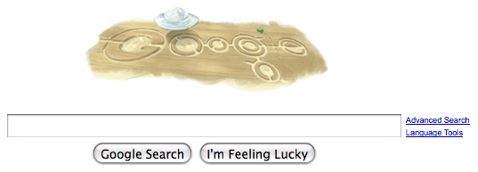 For the second time this month, Google is playing in the paranormal realm. The logo links to a search for "crop circles." Previously: |
| Posted: 14 Sep 2009 06:09 PM PDT |
| Man awarded $63k for Ketamine "overdose" at hospital Posted: 14 Sep 2009 04:32 PM PDT From a 2007 Vancouver Sun article: VANCOUVER - A Campbell River man has received $63,000 in damages for an "out-of-body experience" in which he said he saw God after being accidentally overdosed with the painkiller Ketamine while recovering from back surgery in Vancouver General Hospital.Shouldn't he actually have paid the hospital extra for that experience? (I kid... kinda.) Damages set at $63,000 in drug mishap (via Dose Nation) |
| The Masonic Myth, by Jay Kinney -- a no B.S. history of Freemasonry Posted: 14 Sep 2009 12:21 PM PDT  I became interested in the Masons after reading Robert Anton Wilson's books. I also thought Masonic pocket watches were cool looking. When I told my friend's father that the Masons intrigued me, he revealed that he was a member and invited me to join ("To be one, ask one"). I joined about 6 or 7 years ago, but have been inactive ever since my second daughter was born. (I'm just a Fellowcraft at this point; I need to complete my 2nd degree proficiency!) A lot of histories of Freemasonry have been written over the years. I tried reading a few, but they seemed fake and/or boring. The book Born in Blood, by John Robinson (linking the Knights Templar to the Masons) was the only one that was interesting, but according to Jay Kinney, author of a new, terrific book called The Masonic Myth, the claims in the Robinson's book (and most other Freemason histories) are unsubstantiated. I've known Jay for many years. He was the publisher of the late, great Gnosis Magazine, the author of several books on Western esoteric and occult traditions, and the author of The Masonic Enigma, "a journey of discovery into the real facts (and mysteries) of Masonry's history and symbols." He's also an amazingly talented cartoonist, and contributed to The Whole Earth Review. (His 1987 WER article, "If Software Companies Ran the Country," where he compares Al Capp's Shmoos to infinitely-copyable software, remains as fresh and powerful today as it did 22 years ago). In the introduction to The Mason Myth, Kinney (a Mason himself) wrote that he wanted his book to be an antidote to both the "imaginative speculations of 'alternative historians,'" and to those Masonic histories that "succumb to the tyranny of minutiae, where a never-ending stream of names, dates, jargon, and organizational details numb the brains of all but the most dedicated reader." In my opinion, he succeeds in both counts, having written a book that's both highly-readable and down-to-earth. Backed up by much scholarly research, Kinney methodically examines, and then busts common myths about Masons (the dollar bill design, links to satanism and the occult, conspiracy to take over the world), replacing the phony facts with the real story. Jay's latest book comes out at the same time as Dan Brown's new novel The Lost Symbol, which reportedly distorts the history of the Masons. (I plan to read Brown's new book, anyway. My friends heap scorn and ridicule on me for the fact that I enjoy Brown's novels. Is it my fault they have no taste?) The Masonic Myth: Unlocking the Truth About the Symbols, the Secret Rites, and the History of Freemasonry |
| Posted: 14 Sep 2009 11:40 AM PDT 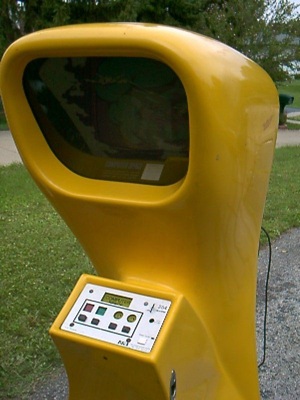 Released in 1971, Computer Space was the first commercially-sold coin-operated video game. Essentially a variation on the digital computer game Spacewar!, Computer Space was created by Nolan Bushnell and Ted Dabney who would go on to found Atari the following year. Two units just sold on eBay: a rare yellow model that went for $3000 and also a two-player (but not entirely functional) green version that sold for $1500. That yellow one would have gone perfectly with my Fender Rhodes Student Model keyboard. (via Technabob) Released in 1971, Computer Space was the first commercially-sold coin-operated video game. Essentially a variation on the digital computer game Spacewar!, Computer Space was created by Nolan Bushnell and Ted Dabney who would go on to found Atari the following year. Two units just sold on eBay: a rare yellow model that went for $3000 and also a two-player (but not entirely functional) green version that sold for $1500. That yellow one would have gone perfectly with my Fender Rhodes Student Model keyboard. (via Technabob) |
| Posted: 14 Sep 2009 01:14 PM PDT Tomorrow sees the release of Dan "Da Vinci Code" Brown's long-awaited new novel The Lost Symbol. Apparently, one big theme of the book is the influence Freemasonry had on American history. (In fact, one of the Boing Boingers is a Freemason. Can you guess which one of us? ANSWER: IT'S MARK!) Pegged on the book's publication, Mitch Horowitz wrote a brief essay for US News And World Report about the "real" impact of Freemasonry on this country. Of course, Mitch is the author of his own new book, "Occult America: The Secret History of How Mysticism Shaped Our Nation." In a couple of weeks, he'll be guestblogging here on Boing Boing and I can't wait! From US News And World Report: Masons and the Making of America (US News & World Report) Buy "Occult America: The Secret History of How Mysticism Shaped Our Nation" (Amazon) Buy "The Lost Symbol" (Amazon) Previously: |
| Posted: 14 Sep 2009 11:13 AM PDT Janna Levin, a professor of physics and astronomy at Barnard College of Columbia University, narrates this two-minute video about The Big Bang. Watch it in high definition here. |
| All publicly funded content should be in the public domain. Posted: 14 Sep 2009 11:18 AM PDT Jesse Brown, a BoingBoing guest-blogger, is the host of TVO's Search Engine podcast. A few years ago I hosted a mini-series for CBC Radio called The Contrarians, a show about "unpopular ideas that just might be right". Each week I'd take a controversial opinion and try it on for size. Sometimes the show was serious, sometimes it was silly- I rarely agreed with the positions I took, but operated on the principle that no idea is so radical or offensive that we should be forbidden to contemplate it (if only to learn why we should discard it). The CBC brass was incredibly supportive of the project and I was given license to explore a lot of unorthodox subject matter. Topics included:
I'd love to link to these shows now, but I can't. They were never posted online or offered as podcasts. I tried posting them on my personal website, and was instructed to take them down by CBC management. I was told I was violating their copyright. Every now and then I'll get an email from a teacher or listener requesting an episode of The Contrarians, and I have to explain that I'd be breaking the law to send one. Let's put aside my personal frustration at having my work locked away. The real question here is, since CBC content is funded by the public, shouldn't the public own it? Or at least have access to it? Actually, the CBC archives are just the tip of the iceberg: the overwhelming majority of stuff made for Canadians with Canadians' money is inaccessible to Canadians. In Canada, movies are supported by Telefilm, TV by the Canadian Television Fund, books and art by The Canada Council for the Arts, and so on. But most of this stuff isn't distributed very well or for very long, and you can only get your hands on a fraction of it. So I want to put forth one more contrarian position: I think that any publicly funded content should (within, say, 5 years of its creation) be released to the public domain. Thoughts? (Un-Canadians welcome. Let's open an international discussion about this.) |
| Scratch-built miniature arcade game replica Posted: 14 Sep 2009 10:59 AM PDT |
| Paul Krassner reading at Skylight books in LA, September 15, 2009 Posted: 14 Sep 2009 10:54 AM PDT Boing Boing patron saint Paul Krassner is reading from his new book, Who's To Say What's Obscene?: Politics, Culture and Comedy In America Today, at Skylight Books on Tuesday, September 15, 2009 at 7:30 pm.
Paul Krassner reading at Skylight books in LA, September 15, 2009
Previously:
|
| Posted: 14 Sep 2009 10:52 AM PDT  This real Tyrannosaurus rex skeleton will go to the highest bidder at an incredible natural history auction to be held on October 3 in Las Vegas. Expected to sell for $2 to $8 million dollars, the female T. rex is just one of 50 lots on the block, including a 7-foot-long fossil shark and a 28-foot-long duck-billed dinosaur. Bonhams' Natural History auction (via Wired, thanks Lindsay Tiemeyer!) |
| Photos of an 1890s camping trip Posted: 14 Sep 2009 10:34 AM PDT  Amy Crehore scanned these remarkable photos of her ancestors on a camping trip in 1890 and 1891. Click on the photos for enlargement -- they are worth a close look! Stripes must have been "in" at the "Dew Drop Inn". See the girl playing her tennis racket like a guitar in the top photo? I found these two gems in a box of ancient family photos. I was related to these people.Camping in 1890 |
| Yet another creepy research paper proving you have no privacy online Posted: 14 Sep 2009 10:17 AM PDT Research by Carnegie Mellon professor Latanya Sweeney and other experts shows that an alarming number of seemingly innocuous, neutral, or "common" data points, can potentially identify an individual online. "Privacy law, mainly clinging to a traditional intuitive notion of identifiability, has largely not kept up with the technical reality," says the EFF's Seth Schoen: A recent paper by Paul Ohm, "Broken Promises of Privacy: Responding to the Surprising Failure of Anonymization", provides a thorough introduction and a useful perspective on this issue. Prof. Ohm's paper is important reading for anyone interested in personal privacy, because it shows how deanonymization results achieved by researchers like Latanya Sweeney and Arvind Narayanan seriously undermine traditional privacy assumptions. In particular, the binary distinction between "personally-identifiable information" and "non-personally-identifiable information" is increasingly difficult to sustain. Our intuition that certain information is "anonymous" is often wrong.What information is "personally identifiable"? (EFF Deep Links) |
| Jim Carroll interview from 1987 Posted: 14 Sep 2009 09:51 AM PDT  Here's a scanned copy of an interview with the recently-departed punk poet icon Jim Carroll, by Joseph Menn in the Boston Globe. The article is not available anywhere online, and it's a fascinating read, so I'm glad Joe scanned it and published to Flickr. Joe says, "[The interview took place] in person, at a Boston hotel in 1987. He was an amazing mix of imaginative power at work and straight-up stoner dude. He talked about how when he was in heroin withdrawal, the images he wanted would pile up uselessly like parked cars, then move too fast for him to catch, as in Koyanisqaatsi. But first he saw the chocolate on his pillow and said, 'Man, I could dig THAT later!'" Flickr set of scanned images. Click "all sizes" on each scanned page to view a size large enough to read comfortably on-screen, they're scanned in high-rez. You can follow Joe on Twitter here. Previously on BB: The great punk poet Jim Carroll has died. |
| Posted: 14 Sep 2009 09:32 AM PDT  BB pal Andrew Baron shot some neat phonecam snapshots of his sugar-coma-inducing visit inside the NYC om nom nom mecca known as Dylan's Candy Bar. Five thousand kinds of candy here, according to the company website (via @andrewbaron). |
| Mighty Boosh fans: New "The Moon" screensavers. Posted: 14 Sep 2009 09:31 AM PDT  Oh, I love these "I'm the Moon" screensavers. Apparently, new stuff. Silent and talking versions. I want one immediately. Non-Boosh-fans: The Moon is one of the weirdo recurring characters from the TV show/stage phenom/cultural oddity "The Mighty Boosh," and is played by Noel Fielding. During Boing Boing Video's interview of Fielding and co-creator Julian Barratt, I asked where the moon character came from, and the answer was something like -- a hodgepodge of speech accents... an Eastern European girlfriend of one of their friends, mixed with "mildly retarded man-on-the-street." Online: imthemoon.tv Oh, I love these "I'm the Moon" screensavers. Apparently, new stuff. Silent and talking versions. I want one immediately. Non-Boosh-fans: The Moon is one of the weirdo recurring characters from the TV show/stage phenom/cultural oddity "The Mighty Boosh," and is played by Noel Fielding. During Boing Boing Video's interview of Fielding and co-creator Julian Barratt, I asked where the moon character came from, and the answer was something like -- a hodgepodge of speech accents... an Eastern European girlfriend of one of their friends, mixed with "mildly retarded man-on-the-street." Online: imthemoon.tv
Previously:
|
| You are subscribed to email updates from Boing Boing To stop receiving these emails, you may unsubscribe now. | Email delivery powered by Google |
| Google Inc., 20 West Kinzie, Chicago IL USA 60610 | |




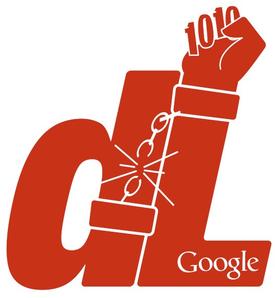 We're a small team of Google Chicago engineers (named after a Monty Python skit about the Judean People's Front) that aims to make it easy for our users to transfer their personal data in and out of Google's services by building simple import and export functions. Our goal is to "liberate" data so that consumers and businesses using Google products always have a choice when it comes to the technology they use.
We're a small team of Google Chicago engineers (named after a Monty Python skit about the Judean People's Front) that aims to make it easy for our users to transfer their personal data in and out of Google's services by building simple import and export functions. Our goal is to "liberate" data so that consumers and businesses using Google products always have a choice when it comes to the technology they use.  The hourglass does not require any electricity; simply combine 2 1/4 cups of coarsely ground coffee beans with 3 1/2 cups of water in the brewing chamber and allow the coffee to infuse with the water for 12 to 24 hours. When the infusion process is complete, turn the hourglass over and 16 oz. of extract instantly drains through a reusable stainless steel filter and into the extract chamber. Combine some of the extract with hot water for traditional coffee or cold water for iced coffee. The extract can be kept in the included carafe and stored in a refrigerator for up to two weeks.
The hourglass does not require any electricity; simply combine 2 1/4 cups of coarsely ground coffee beans with 3 1/2 cups of water in the brewing chamber and allow the coffee to infuse with the water for 12 to 24 hours. When the infusion process is complete, turn the hourglass over and 16 oz. of extract instantly drains through a reusable stainless steel filter and into the extract chamber. Combine some of the extract with hot water for traditional coffee or cold water for iced coffee. The extract can be kept in the included carafe and stored in a refrigerator for up to two weeks. 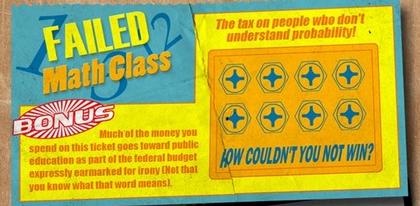
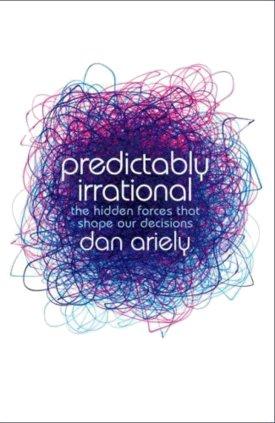 5. Design for Procrastination
5. Design for Procrastination 
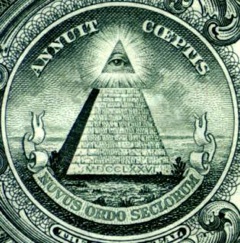 (George) Washington and other early American Freemasons rejected a European past in which one overarching authority regulated the exchange of ideas. And this outlook is found in one of the greatest symbols associated with Freemasonry: The eye-and-pyramid of the Great Seal of the United States, familiar today from the back of the dollar bill. The Great Seal's design began on July 4th, 1776, on an order from the Continental Congress and under the direction of Benjamin Franklin (another Freemason), Thomas Jefferson, and John Adams. The Latin maxim that surrounds the unfinished pyramid—Annuit Coeptis Novus Ordo Seclorum—can be roughly, if poetically, translated as: "God Smiles on Our New Order of the Ages." It is Masonic philosophy to the core: The pyramid, or worldly achievement, is incomplete without the blessing of Providence. And this polity of man and God, as Masonry saw it, required a break with the religious order of the Old World and a renewed search for universal truth. In its symbols and ideas, Masonry conveyed a sense that something new was being born in America: that the individual's conscience was beyond denominational affiliation or government command.
(George) Washington and other early American Freemasons rejected a European past in which one overarching authority regulated the exchange of ideas. And this outlook is found in one of the greatest symbols associated with Freemasonry: The eye-and-pyramid of the Great Seal of the United States, familiar today from the back of the dollar bill. The Great Seal's design began on July 4th, 1776, on an order from the Continental Congress and under the direction of Benjamin Franklin (another Freemason), Thomas Jefferson, and John Adams. The Latin maxim that surrounds the unfinished pyramid—Annuit Coeptis Novus Ordo Seclorum—can be roughly, if poetically, translated as: "God Smiles on Our New Order of the Ages." It is Masonic philosophy to the core: The pyramid, or worldly achievement, is incomplete without the blessing of Providence. And this polity of man and God, as Masonry saw it, required a break with the religious order of the Old World and a renewed search for universal truth. In its symbols and ideas, Masonry conveyed a sense that something new was being born in America: that the individual's conscience was beyond denominational affiliation or government command. 

No comments:
Post a Comment